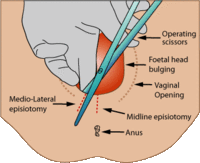
A comparative study of obstetric anal sphincter injuries in vaginal deliveries of twins and singleton pregnancies
Sign Up to like & getrecommendations! Published in 2018 at "Neurourology and Urodynamics"
DOI: 10.1002/nau.23727
Abstract: Increasing numbers of twin pregnancies necessitate investigation of the risk factors associated with obstetric anal sphincter injuries (OASIS). The aims of this study were to establish the incidence of OASIS, and compare women delivering twins… read more here.
Keywords: study obstetric; anal sphincter; sphincter injuries; comparative study ... See more keywords

Management and consequences of obstetrical anal sphincter injuries: Review.
Sign Up to like & getrecommendations! Published in 2021 at "Journal of visceral surgery"
DOI: 10.1016/j.jviscsurg.2020.10.010
Abstract: Obstetrical anal sphincter injuries (OASI), formerly referred to as "complete" or "incomplete" perineal tears, are a frequent complication of childbirth. They can lead to intestinal consequences (anal incontinence, ano-genital fistula) or sexual consequences (dyspareunia, genital… read more here.
Keywords: anal sphincter; sphincter injuries; management consequences; sphincter ... See more keywords

The Great Divide: Country of birth as a risk factor for obstetric anal sphincter injuries
Sign Up to like & getrecommendations! Published in 2018 at "Australian and New Zealand Journal of Obstetrics and Gynaecology"
DOI: 10.1111/ajo.12672
Abstract: Obstetric anal sphincter injuries (OASIS) can complicate up to 6% of births and are a major contributor to preventable maternal morbidity. Asian women have a risk of third and fourth degree perineal tears up to… read more here.
Keywords: risk; anal sphincter; sphincter injuries; great divide ... See more keywords

Obstetric anal sphincter injuries among women with gestational diabetes and women without gestational diabetes: A NSW population‐based cohort study
Sign Up to like & getrecommendations! Published in 2019 at "Australian and New Zealand Journal of Obstetrics and Gynaecology"
DOI: 10.1111/ajo.12950
Abstract: Obstetric anal sphincter injuries (OASIs) are associated with maternal morbidity; however, it is uncertain whether gestational diabetes (GDM) is an independent risk factor when considering birthweight mode of birth and episiotomy. read more here.
Keywords: gestational diabetes; injuries among; anal sphincter; sphincter injuries ... See more keywords

Do doctors preferring forceps encounter more obstetric anal sphincter injuries: A retrospective analysis
Sign Up to like & getrecommendations! Published in 2022 at "Australian and New Zealand Journal of Obstetrics and Gynaecology"
DOI: 10.1111/ajo.13590
Abstract: Obstetric anal sphincter injuries (OASIS) is a hospital‐acquired injury and can affect a woman's quality of life with problems such as anal incontinence, perineal pain, dyspareunia, mental health, psychosexual issues, and concerns about future childbirth… read more here.
Keywords: doctors preferring; anal sphincter; preferring forceps; obstetric anal ... See more keywords

Reducing birth trauma programs – Diagnosis of anal sphincter injuries should be improved
Sign Up to like & getrecommendations! Published in 2019 at "Acta Obstetricia et Gynecologica Scandinavica"
DOI: 10.1111/aogs.13748
Abstract: It is a shared belief that prevention of obstetric anal sphincter injuries (OASIS) is of utmost importance, as they are the main reason for subsequent development of anal incontinence in women. Therefore, any intervention for… read more here.
Keywords: anal sphincter; sphincter injuries; birth trauma;

Obstetric anal sphincter injuries—Maternal, fetal and sociodemographic risk factors: A retrospective register‐based study
Sign Up to like & getrecommendations! Published in 2022 at "Acta Obstetricia et Gynecologica Scandinavica"
DOI: 10.1111/aogs.14425
Abstract: Obstetric anal sphincter injuries (OASIS) are severe complications to vaginal births with potentially serious long‐term consequences and large impact on quality of life. The aim was to determine risk and protective factors for OASIS. read more here.
Keywords: anal sphincter; obstetric anal; injuries maternal; risk ... See more keywords

'Hands-off/poised' or 'Hands-on' method among Chinese midwives: A cross-sectional survey.
Sign Up to like & getrecommendations! Published in 2019 at "Journal of clinical nursing"
DOI: 10.1111/jocn.14879
Abstract: AIMS AND OBJECTIVES To determine midwives' preference for "Hands-on" and "Hands-off/poised" methods and to explore the impact factors. BACKGROUND With the increasing rate of obstetric anal sphincter injuries, great controversy surrounds the "Hands-on" or "Hands-off"… read more here.
Keywords: hands poised; anal sphincter; sphincter injuries; hands method ... See more keywords